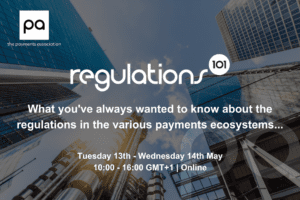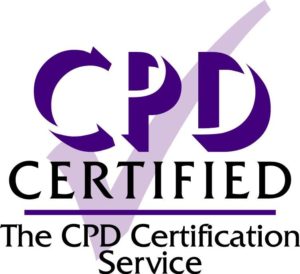
The payments industry is a complex matrix of regulations, licences and permissions. Lack of compliance can be costly and damaging to any business. Not understanding regulatory compliance is simply not an option. Regulations 101 can help you!
Why Regulations 101?
What you’ve always wanted to know about the regulations in the various payments ecosystems…
This Regulations 101 training course will cover payments regulations and frameworks (e.g. SEPA, PSD2, IFR, Open Banking, AML and other financial crime related regulations) as well as privacy and security regulations and standards (e.g. GDPR, incl. SCHREMS II, PCI DSS and others), and their potential overlaps.
It will also give an appreciation of the various types of licenses and permissions (and the relevant regulatory bodies) that need to be obtained by the various players in the ecosystems. Where possible, it will also give an overview of relevant regulations outside of Europe. The course combines presenter-led sessions and thought-provoking videos. Drawing on real life examples, it weaves together the underpinning principles of legislation and other rules, with practical considerations.
Payments 101 (or similar experience) is a prerequisite, as payments fundamentals and terminology knowledge is assumed. We highly recommend attending our Payments 101 course beforehand if you don’t have enough relevant experience in the field of Regulation.
“Fantastic facilitator, incredible content provided and shared. This has been one of the best training programmes I have attended in the past 3 years!”
Tejal Daya, Compliance, Paymentology
“Great training course bringing together the industry’s legal and compliance innovations & challenges, and reflects on current events and affairs in the business in enterprises and fintech alike.”
Jaroslav Pantsjoha, Cloud Practice Lead, Contino Solutions
Morning: Ecosystem recap, SEPA, IFR
Afternoon: Important regulations
Morning: Payments licences and permissions
Afternoon: Payment Standards & Future Outlook

Course trainer: Neira Jones, FBCS, MsC
Neira advises organisations of all sizes on payments, fintech, regtech, cybercrime, information security, regulations (e.g. PSD2, GDPR, AML) and digital innovation. More than 20 years in financial services and technology made her believe in change through innovation & partnerships. She always strives to demystify the hype surrounding current issues and also enjoys her work as an expert witness. She likes engaging on social media and regularly addresses global audiences as a keynote speaker or chair-person.

This course is CPD accredited. Attendees will receive 6 CPD points having attended the course. In order to receive full accreditation for the course, you must attend the full course. Please contact Orlanna Morris at [email protected] to receive your certificate at the end of the course.
Why should I attend?
This course covers the main regulations, frameworks, and standards applicable to the UK and Europe, with brief coverage of other geographies. It combines engaging presenter-led sessions, thought-provoking videos and discussions, interactive tests, drawing on real-life examples and weaving together the underpinning principles and compliance requirements, with practical applications. Includes PSD, IFR, Open Banking, AML, EMV, PCI DSS, etc.
What will I gain?
Regulations 101 gives an up-to-date understanding of the various types of licences and permissions applicable to the various payment ecosystem players and their relevant regulatory bodies. Where possible, it will also give an overview of relevant regulations outside of Europe.
Who should attend?
Suitable for those who have already attended Payments 101 or possess equivalent knowledge.
Bespoke Training courses for your teams
Would you like to run one of our 3 training courses for your team? We can easily arrange this for you.
What you’ll get:
PRE-EVENT
ON THE DAY(S)
POST EVENT
Cost for bespoke training course:
Reach out to Tom McCormick, Sales Director, on [email protected] for more information.
The Payments Association
St Clement’s House
27 Clements Lane
London EC4N 7AE
© Copyright 2024 The Payments Association. All Rights Reserved. The Payments Association is the trading name of Emerging Payments Ventures Limited.
Emerging Ventures Limited t/a The Payments Association; Registered in England and Wales, Company Number 06672728; VAT no. 938829859; Registered office address St. Clement’s House, 27 Clements Lane, London, England, EC4N 7AE.







Log in to access complimentary passes or discounts and access exclusive content as part of your membership. An auto-login link will be sent directly to your email.
We use an auto-login link to ensure optimum security for your members hub. Simply enter your professional work e-mail address into the input area and you’ll receive a link to directly access your account.
Instead of using passwords, we e-mail you a link to log in to the site. This allows us to automatically verify you and apply member benefits based on your e-mail domain name.
Please click the button below which relates to the issue you’re having.
Sometimes our e-mails end up in spam. Make sure to check your spam folder for e-mails from The Payments Association
Most modern e-mail clients now separate e-mails into different tabs. For example, Outlook has an “Other” tab, and Gmail has tabs for different types of e-mails, such as promotional.
For security reasons the link will expire after 60 minutes. Try submitting the login form again and wait a few seconds for the e-mail to arrive.
The link will only work one time – once it’s been clicked, the link won’t log you in again. Instead, you’ll need to go back to the login screen and generate a new link.
Make sure you’re clicking the link on the most recent e-mail that’s been sent to you. We recommend deleting the e-mail once you’ve clicked the link.
Some security systems will automatically click on links in e-mails to check for phishing, malware, viruses and other malicious threats. If these have been clicked, it won’t work when you try to click on the link.
For security reasons, e-mail address changes can only be complete by your Member Engagement Manager. Please contact the team directly for further help.